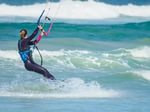When Bryan Buffaloe was born 34 years ago, his uncle bought him a membership in the U.S. Parachute Association, making him unofficially the youngest member of the national skydiving organization.
It would take the San Carlos native another 29 years before he had both the courage and the health insurance coverage to make good on his uncle’s wish and made his first leap out of an airplane. He’s been screaming through the skies ever since. Last week, Buffaloe won the national championship in advanced canopy piloting at the 2019 USPA National Skydiving Championships in North Carolina.
Buffaloe is one of just 50 or so American skydivers who compete in the extreme sport, which requires years of training and thousands of jumps to master precisely navigating, turning and landing in a narrowly plotted aerial course over water at speeds up to 75 miles an hour.

Bryan Buffaloe, 34, of San Diego on the medals stand at the the United States Parachute Association’s National Parachuting Championships in North Carolina last week. Buffaloe won the national championship in advanced canopy piloting.
(Courtesy of USPA/David Cherry)
Buffaloe said he loves the rush of adrenaline he gets every time he leaps out of a plane. It makes for a nice contrast from his day job as a Merchant Marine officer, where the safety goal of piloting container ships around the world is to make every trip as quietly uneventful as possible.
“In my line of work we like it to be 99 percent boring because there will be that 1 percent sheer terror moment that happens, and we like to be prepared for it,” he said.
From a young age, Buffaloe had a taste for adventure. As a teenager, he was a competitive sailor and has enjoyed racing sailboats, surfing, kiteboarding, hiking and other outdoors sports. After graduating from Patrick Henry High in 2003, he attended the The California State University Maritime Academy in Vallejo and became a merchant mariner.
Over the years, he has traveled around the Azores, Africa, the Mediterranean, South America, the Caribbean, Asia and throughout the Pacific Ocean on cargo and container ships carrying everything from food aid to military equipment. His job is serving as ship’s watch officer, ensuring the safe navigation of the vessel. Over the years, he’s had a few near misses with sea pirates, but fortunately never any incidents.
The job requires him to be at sea for four months at a time, up to eight months of the year. While that makes it hard to have a stable home life in San Diego, it does allow for long stretches of time to train in skydiving.

San Diego skydiver Bryan Buffaloe uses his feet to help navigate the course last week at the U.S. Parachute Association’s 2019 National Skydiving Championships, where he won the national title in advanced canopy piloting.
(Courtesy of Megan Hackett)
Buffaloe took his first jump in 2014 at Skydive San Diego in Otay Mesa. Riding up in the jump plane that day, he wasn’t sure he’d have the guts to ever take a second jump, but that changed a few seconds after he went into free fall.
“The second my chute opened at 6,000 feet, I looked around and said, ‘that’s it, I’m hooked. I’ll never do any other sport,’” he said. “The adrenaline rush was part of it, but it was also the fact that I get to fly. And the big draw for me is the people who are associated with the sport. The friendships I’ve made are what keeps me in the sport.”
As he gained experience, Buffaloe moved into the field of advanced canopy piloting, which is so difficult that only the most experienced competitors practice it. It takes a long time to understand the physics of navigating these high-tech chutes, he said.
“These are the Formula 1 race cars of skydiving,” he said. “They travel at very high rates of speed and they’re very sensitive to body (movements). They’re designed so we can make them go as fast as possible.”
The focus of canopy piloting isn’t about the free-fall portion of the jump but the maneuvers the pilots make with their canopy-style chutes when they are coming in for a landing. Although it’s a dangerous sport, Buffaloe said he’s been fortunate to never suffer an injury.

San Diego skydiver Bryan Buffaloe, back row third from left, poses with other medalists last week at the U.S. Parachute Association’s 2019 National Skydiving Championships, where he won the national title in advanced canopy piloting.
(Courtesy photo)
Diving vertically at up to 105 miles an hour, the pilots line themselves up at the precise angle to enter a 10-meter-wide course of inflated pylons on a lake, where they compete in the disciplines of speed, distance and accuracy. For the speed contest, the pilot needs to stay within the boundaries of a course that’s 10 meters wide and 70 meters long while executing a 70-degree turn. For the accuracy challenge, they must navigate a 10-by-50 meter water course and land within a 1-by-2-meter landing pad. For distance, they must stay within the course for the maximum distance.
Buffaloe beat out 15 other national competitors last week to take the overall gold medal in advanced canopy piloting in all three disciplines, as well as the individual gold medal for speed. The overall win qualified him as a professional pilot and will now allow him to compete at the international level, a goal he plans to pursue in future years.
When he’s not at sea or training for competition, Buffaloe works as a load organizer at Skydive San Diego. His specialty is working with less experienced jumpers to teach them the practice of safer skydiving skills.
“What I tell people,” he said, “is to take your time, learn from people who have been doing this for a while and recognize that there’s a lot out there that you do not know.”





Recent Comments